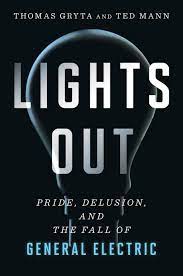Dr. Jay Akridge, Trustee Chair in Teaching and Learning Excellence and Professor, Provost Emeritus, Purdue University
“Lights Out: Pride, Delusion, and the Fall of General Electric” by Thomas Gryta and Ted Mann
One can learn much from books that share business success stories. And one can learn, perhaps even more, from stories about businesses – and business leaders – who lost their way. “Lights Out: Pride Delusion, and the Fall of General Electric” (2020) by Thomas Gryta and Ted Mann is the latter: an informative, insightful read on the tragic decline of one of America’s greatest corporations.
GE was founded in 1892 by “melding Thomas Edison’s workbench with J.P Morgan’s financial might.” Growing with America’s middle class, GE provided lightbulbs and energy, credit and airplane engines, X-Ray machines and kitchen appliances, along with so much more to a country with an ever-expanding appetite for industrial and consumer goods and services. Through the 1980s and 1990s, CEO Jack Welch built GE into a global powerhouse and became the most recognizable and respected CEO in the U.S., and likely the world. GE’s talent development program was legendary, as was Welch’s relentless focus on operating excellence, pruning underperforming businesses and leaders, and consistently hitting the marks for Wall Street. In 2000, GE was worth $600 billion – the most valuable company in America. However, the next two decades saw an epic collapse in the firm’s fortunes. In 2021, GE announced it would divide into three publicly traded companies: GE Aerospace, GE HealthCare, and GE Vernova (energy) – a shell of the GE the world had come to know. The story of what happened and why is told by Wall Street Journal reporters Gryta and Mann.
Gryta and Mann pick up the story as GE is choosing Jack Welch’s successor – a three-candidate race won by Jeff Immelt, then CEO of GE Healthcare Systems. Immelt was an extraordinarily talented and ambitious executive with an outside personality and inspirational leadership, along with superb communications skills. As he transitioned into his new role, Immelt was a CEO who desperately wanted to eclipse the two decades of unparalleled success of his predecessor.
In short, pithy chapters that remind one of Wall Street Journal articles, Grtya and Mann tell a complex story of corporate decline as GE worked to navigate the financial crisis of 2007-2008, the emergence of the Internet and business digitization, and increasing dissatisfaction with the conglomerate business strategy, among other general economic challenges. But, GE’s demise was about much, much more than external headwinds, and the authors provide deep insight into a corporate culture where hubris reigned – GE managers could run any business better than anyone else. It was a culture where a near manic focus on revenue growth and share price drove decisions with devastating consequences. And, it was a culture that refused to admit mistakes, call out bad decisions, and take corrective action – especially decisions made by or supported by the CEO. Corporate politics run rampant in this story, and posturing for the GE Board, investors, regulators, and the general public led to enormous disconnects between the external image of GE and its internal operating reality.
Grtya and Mann tell a complex story of corporate decline as GE worked to navigate the financial crisis of 2007-2008, the emergence of the Internet and business digitization, and increasing dissatisfaction with the conglomerate business strategy, among other general economic challenges. But, GE’s demise was about much, much more than external headwinds, and the authors provide deep insight into a corporate culture where hubris reigned – GE managers could run any business better than anyone else. It was a culture where a near manic focus on revenue growth and share price drove decisions with devastating consequences. And, it was a culture that refused to admit mistakes, call out bad decisions, and take corrective action – especially decisions made by or supported by the CEO. Corporate politics run rampant in this story, and posturing for the GE Board, investors, regulators, and the general public led to enormous disconnects between the external image of GE and its internal operating reality.
If you are looking for a good read on what not to do, and a stark reminder that no organization, no matter how large and powerful, is exempt from the challenges of rapidly changing markets, poor decision-making, misguided priorities, and a corporate culture that refuses to acknowledge bad news, then take a look at “Lights Out.” The book is a primer on business leadership, strategic decision-making, and corporate politics and is well worth the read.





